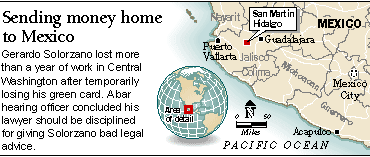 |
 |
 |
|
|
Sunday, April 4, 2004 'I believed him and I suffered': Bad legal advice may have cost a man his green card, his livelihood
He made about $1,200 a month and, each month, sent $500 home. That's where, in tiny San Martin Hidalgo, Solorzano's nursery job was building his family a three-room house with a pink cement floor, a refrigerator and two TVs. But when Solorzano pleaded guilty to felony drug possession — upon the counsel of his public defender — he lost his "green card" and, for more than a year, his livelihood. A state bar hearing officer would later conclude the attorney gave Solorzano bad legal advice. On Sunday, June 20, 1999, Solorzano was outside the trailer when a friend, Jose Palomino, invited him for a drive. Palomino was driving erratically when police pulled him over. Deputies found a bag containing a white powdery substance under the passenger seat and a small plastic baggie with white powdery residue in Solorzano's pocket. The men said they didn't know there were drugs in the car, which belonged to a friend. As for the baggie, Solorzano said he had found it that morning while doing laundry for his roommates. "I was at the laundromat and found it in some pants," he says in Spanish. "I forgot to throw it away." Palomino, a nursery foreman, hired a private attorney for $3,000, and got his felony drug charge dropped in exchange for a guilty plea to drunken driving, a misdemeanor. He served no jail time. Solorzano couldn't afford his own lawyer, so was assigned a public defender: Guillermo Romero. Solorzano, then 40, had only a fourth-grade education. Despite years in the United States, he spoke little English. He had no criminal record and little knowledge of the legal system.
So he put his trust in his attorney, comforted that Romero was Latino and spoke some Spanish.
According to later bar proceedings against Romero, and interviews with Solorzano and his boss — C&O Nursery Vice President Richard Snyder — here's how that trust was violated: In November, five months after the arrest, Romero met with Solorzano. Snyder went along to support Solorzano, a valued employee and friend. At that meeting, Snyder says, Romero told them that the amount of cocaine residue found in the baggie was so small that he could get the charge reduced to a misdemeanor. He also told Solorzano it would be OK to visit Mexico for a while, and that he would seek a spring trial date. "It wasn't like, 'We will contact you to see if it's OK,' " Snyder says. "It was, 'Don't worry about it, it's taken care of.' " What Romero didn't tell Solorzano was that he had already missed a trial date a month before that meeting. Nor did Romero tell Solorzano that his bail conditions prevented him from leaving the country. So when Solorzano returned from Mexico, he was arrested for missing his trial date — adding to his woes. Romero then advised him to plead guilty to the felony drug charge rather than go to trial, Solorzano says. He also told Solorzano the plea wouldn't put him at risk of deportation, the bar hearing officer found. But the hearing officer said Solorzano should have known anyway; before Solorzano signed his guilty plea, an interpreter read him a multi-page statement that included one sentence about immigration consequences. Solorzano says he was nervous at the time and didn't pay close attention to the interpreter, instead trusting Romero. "All I would ask him about were my papers, if I was going to have any problems with my papers, because that's all I have," Solorzano says. "And he would say, 'No, you are not going to have any problems with your papers. They are not going to take them away.' " The bar also noted other alleged lapses by Romero: He could have argued that police exceeded their authority in searching Solorzano; he could have argued that Solorzano was unwittingly in possession of drugs; and he could have challenged the state's drug analysis, citing possible discrepancies between the drugs found in the arrest and those tested. Romero did none of that. As a result, he failed to resolve doubts about Solorzano's guilt — or innocence. Solorzano was sentenced to 160 hours of community service — later converted to 20 days in jail when he had trouble finding rides to the community-service job. While he was in jail, immigration authorities took away his green card. That put his immigration status in limbo. After getting out of jail, Solorzano wanted to get his documents back in order. But when he got word that his mother was dying of cancer, he rushed home to San Martin Hidalgo. And that's where he stayed for 16 months, afraid to return to the U.S. without proof of legal residency. He found occasional farm and construction jobs for about $10 a day. He halted work on his small house and fell $3,000 in debt. He says he envied the other men when they left for "El Norte." "I don't know if it was the system or the lawyer, but for me, things went really bad," he says. Solorzano returned to Grant County last month and is back at work at the nursery. A green card in his name, valid through 2013, arrived at the trailer in George last winter. His brother, who also works at the nursery, took it to Mexico. Solorzano doesn't know why the card was renewed, or if he's in the clear with immigration. Maybe he could have been spared those doubts, he says, if he had been able to afford his own attorney. — By Florangela Davila and Ken Armstrong, Seattle Times staff reporters
|
|
|||||||||||
seattletimes.com home
Home delivery
| Contact us
| Search archive
| Site map
| Low-graphic
NWclassifieds
| NWsource
| Advertising info
| The Seattle Times Company


